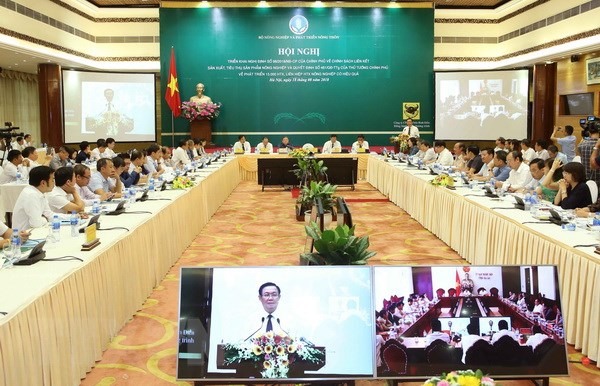 Society
Society

Deputy Prime Minister Vương Đình Huệ has stressed the importance of establishing co-operatives as a link among farmers, enterprises and economic sectors to restructure agriculture and develop new rural areas.
 |
| Deputy Prime Minister Vương Đình Huệ speaks at a conference to discuss policies about linking production and consumption of agricultural products and the development of 15,000 co-operatives and unions of agricultural co-operatives until 2020. — VNA/VNS Photo Doãn Tấn |
HÀ NỘI — Deputy Prime Minister Vương Đình Huệ has stressed the importance of establishing co-operatives as a link among farmers, enterprises and economic sectors to restructure agriculture and develop new rural areas.
Addressing a conference held by the Ministry of Agriculture and Rural Development (MARD) on Saturday to discuss policies about linking production and consumption of agricultural products and the development of 15,000 co-operatives and unions of agricultural co-operatives until 2020, Huệ said setting up co-operatives was a mandatory task with farmers as the main subject to enlarge the scale of agricultural production, promote the role of the household economy and strengthen co-operative links between farmers and scientists.
Huệ, who is also head of the Steering Committee for Innovation and Collective Economy Development, stressed the need to continue raising awareness about the necessity of the project to establish 15,000 co-operatives by 2020.
“Agricultural restructuring must go in two directions: reorganising production and improving the application of scientific and technological advances,” Huệ said.
According to the deputy PM, the household economy had enjoyed a golden period and agricultural development had grown tremendously, but now the economic viability of the household business needed a model.
Huệ said that after many efforts from all levels, the collective economy and co-operatives had began to develop, contributing 5.6 per cent to GDP. He believed the target of establishing 15,000 co-operatives by 2020 was feasible.
However, the deputy PM said that the quality of co-operatives should also be emphasised, and that it was necessary to continue consolidating and increasing the quality of the current 4,400 co-operatives operating effectively, of which 1,500 co-operatives needed to apply high technology.
“Weak agricultural co-operatives must move to effective operations by 2020,” Huệ said.
The deputy PM also mentioned improvements in the legal framework for the restructuring of agricultural economy, which he said was the core of the co-operatives.
“Localities should work on plans and measures to integrate their resources and classify co-operatives in order to find the right direction,” Huệ said.
He also said that in addition to capital from the national target programme, other credit sources were very important.
He asked the State Bank of Việt Nam to issue revisions to Decree 55 with more focus on agriculture, farmers and rural areas.
The Ministry of Agriculture and Rural Development (MARD) and localities were asked to re-evaluate the land and assets of co-operatives so as to create conditions for them to fully meet the borrowing criteria from banks.
According to a MARD report, by the end of June, the country had 39 co-operative unions and more than 12,500 co-operatives operating in the agricultural sector, and increase of 908 co-operatives from last year.
Comparing between regions, the Northwest, the Red River Delta and the Mekong River Delta had a high proportion of well-operated agricultural co-operatives.
According to Minister of Agriculture and Rural Development Nguyễn Xuân Cường, agricultural production was large but still suffered from the market volatility and uncertainty.
According to Cường, over the past two years, the number of enterprises operating in the agricultural sector has increased from 3,600 to nearly 8,000.
“There should be links between raw materials, processing and market development through co-operatives, with enterprises at the core,” he said.
At the meeting, Vice Chairman of Lâm Đồng Province’s People ’s Committee Phạm S suggested focusing on deploying high-tech agriculture and smart agriculture while pushing trade promotions to enhance competitive value.
“The Government should also consider accessing co-operative funds to ensure the target of 15,000 co-operatives by 2020,” he said.
According to State Bank of Việt Nam Deputy Governor Nguyễn Thị Hồng, the bank has directed its local branches to remove difficulties and make it easier for co-operatives to access capital. — VNS




